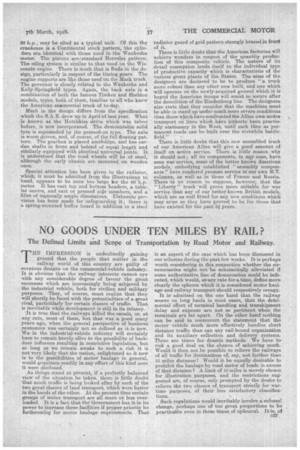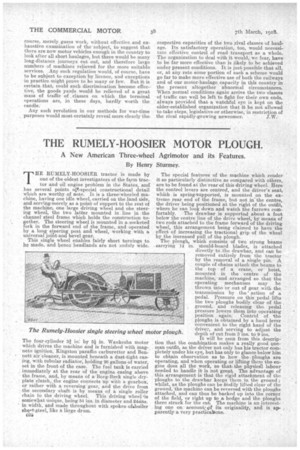NO GOODS UNDER TEN MILES BY RAIL?
Page 15

Page 16

If you've noticed an error in this article please click here to report it so we can fix it.
The Defined Limits and Scope of Transportation by Road Motor and Railway.
THE IMPRESSION is undoubtedly gaining ground that the people that matter in the railway world of this country are guilty of covetous designs on the commercial-vehicle industry. It is obvious that the railway interests cannot eye with any considerable degree of favour the great successes which are increasingly being achieved by the industrial vehicle, both for civilian and military purposes. They, of course, must realize that they will shortly be faced with the potentialities of a great rival, particularly-for certain classes of traffic. That is inevitable while development is still in its infancy. It is true that the railways killed the canals, or, at any rate, most of them, but that was a good many years ago, when the, general perspective of business economics was certainly not so defined as it is now. We in the industrial-vehicle industry will certainly have to remain keenly alive to the possibility of backdoor influence resulting in restrictive legislation, but so long as we remain awake to such a risk it is not very likely that the nation, enlightened as it now is to the possibilities of motor haulage in general, • would eequiesee readily in any effort of this kind once it were disclosed.
As things stand at present, if a perfectly balanced view of the situation be taken, there is little doubt that much traffic is being looked after by each of the two great classes of land transport, which were better in the hands of the other. At the present time certain groups of motor transport are all more> or less overloaded. It is a fact that the' Government has it. in its power to increase these facilities if proper priority be forthcoming for motor haulage requirements. That is an aspect of the case which has been discussed in our columns during the past few weeks. It is perhaps worth considering in this connection whether the cireumstances might not --be substantially alleviated if some authoritative line of demarcation could be indicated, which would, at-any rate for a. time, define more clearly the spheres which it is considered motor haulage and railway transport should respectively occupy.
It is admitted on the one hand that the railway scores on long hauls in most cases, that the detrimental effect of terminal handling and. transhipment delay and expense are not so pertinent when the terminals are far apart. On the other hand nothing can be said to controvert the statement that the motor vehicle mach more effectively handles short distance traffic than can any rail-bound erganization and its auxiliary collection and delivery systems. These are times for drastic methods. We have to risk a good deal on the chance of achieving much. Would it then not be possible to relieve the railways of all traffic for destinations of, say, not further than 10 miles distance'? Would. it be equally desirable to prohibit the haulage by road motor of loads in excess of that distance? A limit of 10 miles is merely chosen for illustration purposes, and the restrictions suggested are, of course, only prompted by the desire to relieve the two classes of transport strictly for wartime purposes, of their less satisfactory. classifications.
Such regulations would inevitably involve a colossal change, perhaps one of too great proportions to be practicable even in these times of upheaval. It is, of course, merely guess work, without effectimand exhaustive examination of the'subject, to suggest that there are now motor vehicles enough in the country to look after all short haulages, but there would be many long-distance journeys cut out, and therefore large numbers of machines relieved for the more suitable services. Any such regulation would, of course, have to be subject to eaception by licence, and exceptions in practice might prove to be many or few. But it is certain that, could such discrimination become effective; the goods yaYds would be relieved of a great mass of traffic of classes on which the terminal operations are, in these days, hardly worth the candle.'
Any such revolution in our methods for war-time purposes would most certainly reveal more clearly the respective capacities of the two rival classes of haulage. Its satisfactory operation,, too, would necessitate effective control of road transport as a whole. The organization to deal with it would, we fear; have to be far more effective than is likely to be achieved under present conditions. It is just possible that all, or, at any rate some portion of such a Scheme would go far to make more effective use of both the railways. and of our motor-haulage capacity in this country in the present altogether abnormal circumstances. When normal conditions again arrive the two classes of traffic can well be left to fight for their own ends, always provided that a watchful eye is kept on the older-established organization that it be not allowed to take steps, legislative or otherwise, in restriction of the rival rapidly-growing newcomer.






















